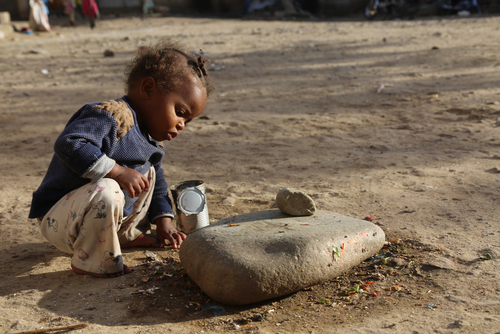A dire need for substantial action
The COVID-19 pandemic has left vast numbers of people facing the dual crisis points of poverty and hunger, but, with renewed and concerted efforts, this year’s G20 summit could be a launchpad to start building the better world we all want
When world leaders gather virtually for the G20 Riyadh Summit hosted by Saudi Arabia in November, their most urgent task will be to address the socio-economic impacts of the unprecedented global crisis caused by COVID-19. A coordinated international response that enables economies to function again and protects the world’s poorest communities against the effects of the pandemic must be at the top of their agenda.
Even before COVID-19 hit, the World Food Programme and the wider humanitarian community were raising the alarm that 2020 would be the worst year for humanitarian crises since the Second World War. We were deeply concerned by the never-ending wars in Syria and Yemen, the deepening crises in hotspots including the Sahel region of West Africa and South Sudan, and the growing consequences of more frequent natural disasters such as floods and droughts. The world was already facing a perfect storm.
Today, the pandemic is laying waste to the global economy and threatens to overwhelm the global humanitarian system. In a few short months, all our old certainties have been banished as COVID-19 has stretched even the most sophisticated health systems almost to the point of collapse, undermined years of economic and development progress, and tested social stability and cohesion in ways we never would have imagined just one year ago.
A hunger pandemic
This invisible menace threatens a hunger pandemic in the poorest countries where the vast majority of WFP’s beneficiaries live. It is a pivotal moment for every nation, every community, every individual. Now is the time for us to unite as one global community behind a coordinated plan to defeat this virus and protect the most vulnerable from its devastating effects.
Governments around the world have invested $17 trillion in fiscal stimulus and central bank support to keep the global economy afloat. The G20 already threw a lifeline to poorer countries by suspending debt repayments until June 2021. But now is the time to show true global leadership with a commitment to provide broad support to low- and middle-income countries as they rebuild their shattered economies and social protection systems.
I have witnessed the destructive socio-economic impact of COVID-19 on already vulnerable communities while visiting WFP’s front-line operations. The fallout is being felt harshly in Latin America, which has seen an almost three-fold rise in the number of people requiring food assistance. Urban communities in poor countries are also suffering hugely, due to job losses and collapsing remittances. Hunger rates are shooting up across West, Central and Southern Africa. In Yemen, already ravaged by years of conflict-fuelled hunger, the virus is now ratcheting up people’s misery to almost unimaginable levels.
As a result of COVID-19, the number of acutely food-insecure people could double, reaching 270 million in a matter of months. There is a real danger that more people will die from the economic impacts of COVID-19 than from the virus itself. One of our beneficiaries told us, “I’d rather die quickly from COVID-19 than slowly from starvation”. But allowing that to happen would be a profound failure on the part of the international community.
Biggest response in history
All around the world, WFP’s front-line teams are working day and night with our partners to get help where it is needed most. We have launched the biggest humanitarian response in our history, aiming to reach up to 138 million people in 2020. WFP’s logistics services are also the backbone of the global response to COVID-19, transporting critical supplies and aid staff on behalf of the entire humanitarian community to the front lines.
WFP stands ready to use our unrivalled expertise and global capabilities to prevent this global health emergency from becoming a hunger pandemic. I am confident we will succeed – as long as we can secure the necessary funds from our donors in the coming months.
But we are entering a new and dangerous phase, as conflict-scarred countries such as Yemen, South Sudan and Burkina Faso edge closer to the abyss of famine. So when the G20 members – the richest and most influential in the world – convene, they should commit to providing substantial new funding for the global humanitarian response to the hunger crisis borne of conflict and COVID-19.
I also call on the G20 leaders to show real political leadership to use their influence to make renewed and concerted efforts to end the destructive conflicts that condemn so many to lives of poverty and hunger.
After all the turmoil of recent months, the Riyadh Summit is a chance to start building the better world we all want. Let’s seize this opportunity and work together, in partnership, to achieve it.












